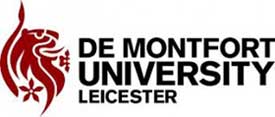Childhood and Youth Studies courses
De Montfort University

- UK
- World Rank : 601
- Visit Website
Would you like a rewarding career supporting vulnerable young people? Do you have a passion to help them reach their full potential? A career in youth and community development is the opportunity to make a crucial difference to people’s lives.
Through gaining the professional skills and knowledge taught on this course, your work can provide support to families and community groups and help keep young people safe.
The blend of practical and academic skills you’ll be taught on this programme can prepare you for a range of jobs across several sectors. It will help develop you as a progressive practitioner, providing opportunities to explore various concepts and practices of social justice and equality. With the option to study either full-time or part-time, you can manage your studies effectively alongside work commitments. This programme is ideal for those who use group work, informal learning, outreach and community work as part of their role, particularly those working with young people and adults often identified as hard to reach.
Throughout this course you’ll benefit from inter-professional learning as the course attracts professionals from a variety of settings and sectors worldwide, including parenting education, youth work, children’s centres, sexual health, drug and substance abuse, housing and homelessness, youth offending, disability, mental health, community development, domestic violence, local government sector, voluntary and not-for-profit sector and non-governmental organisations.
Key features
You should also normally have:
Applications from individuals with no formal academic qualifications, but extensive practical experience, will be considered on an individual basis. You will need to attend an interview or participate in a telephone interview
You must complete a declaration form and enhanced Disclosure and Barring Service (DBS) and criminal record certificate (from your home country), before starting the course, which need to be cleared in accordance with DMU’s admission policy.
English language requirements:
If English is not your first language an IELTS score of 6.5 or equivalent when you start the course is essential. English language tuition, delivered by our British Council accredited Centre for English Language Learning (CELL), is available both before and during the course.
| Type of Institution | Public |
| Campus Setting | Urban |
| Endowment | £1.17 million |
| Number of Campuses | 4 faculties |
| Number/Percentage of International Students | 23205 |
| Total number of Professors | 3240 |
| Student Satisfaction Rate | 86% |
| Graduate Job Rate | 97.3% |
| Number of Residence Vacancy | Around 3000 |
| International fee | Undergraduates- £13240 (annual) Postgraduates- £15950 (annual) |
| Number of Academic Programs | UG, PG, Part time, distance, blended |
| Mode of Program | Full time, distance and online |
| Average Graduate Salary | 19800 pounds a year |
| Field of Study | Avg.Fees |
|---|---|
| Art, Design and Humanities: | £13,750 |
| Business and Law | £13,750-£14,550 |
| Media | £13,750 - £14,250 |
| Engineering | £14,250 |
| Computing | £14,250 |
| Health and Life Sciences | £13,250 - £14,250 |
| Nursing BSc | £14,950 |
| Expenses | Estimated cost in pounds |
|---|---|
| Undergraduate tuition fee | 13,250- 14950 |
| Postgraduate tuition fee | 13600-15,900 |
| On campus accommodation | 5,000-6040 |
| Average cost of living | 97-110 per week |
DMU International Scholarship up to 1500 pounds
| Tuition Fees in UK (1st Year Average) | MS: £17276 | MBA: £17276 | BE/Btech: £16632 | BBA: £15130 | BSc: £16632 | MFin: £19000 | MA: £15560 | MIM: £18241 | MEM: £16950 | MArch: £14271 | BHM: £12662 | MIS: £15344 | MEng: £12876 | MBBS: £28865| MPharm: £15452 |
| Average Accomodation & Food Costs in UK | £850 to £1,050 a month |
| Entrance Exams in UK | TOEFL: 88 | IELTS: 6.5 | PTE: 59 | GMAT: 590 |
| Work and Study in UK | Permitted for 20 hours/week with a valid study permit. |
| Post Study Work Permit in UK | 2 Year after graduation depending on the course. |
| Cost of Student Visa in UK | £348 |
| Student Visa in UK | Your nationality, duration of your stay and purpose of your stay are the three essential factors for UK visa. For Non-EU students UK visa is mandatory. |
| Intakes in UK | There are mainly two intakes in UK: January/February & September/October. |
| Top Job Sectors in UK | IT Engineering, Product Design, Mobile Development, Designers, Logistics, etc. |
| Economy in UK | Growth Rate: 1.3% (2018) 1.4% (2019) 1.4% (2020e), 6th Largest Economy in the World by Nominal |
Tuition & fees :
£ 15,100
Hostel & Meals :
£ 6,384
Total
£ 21,484